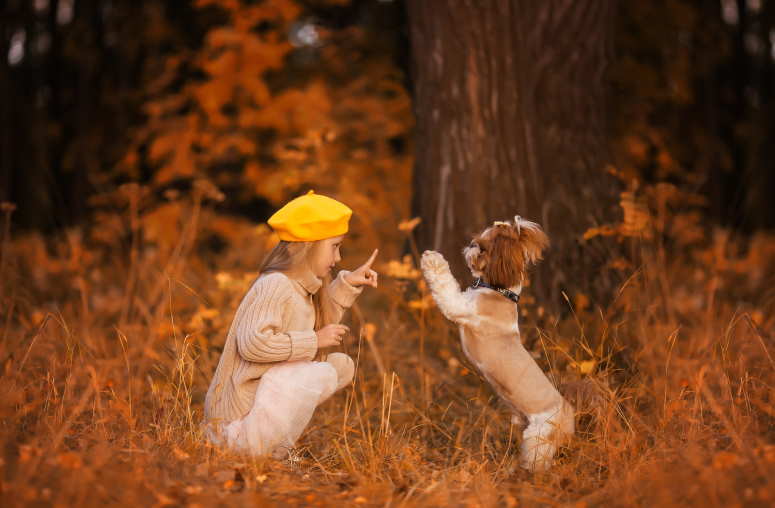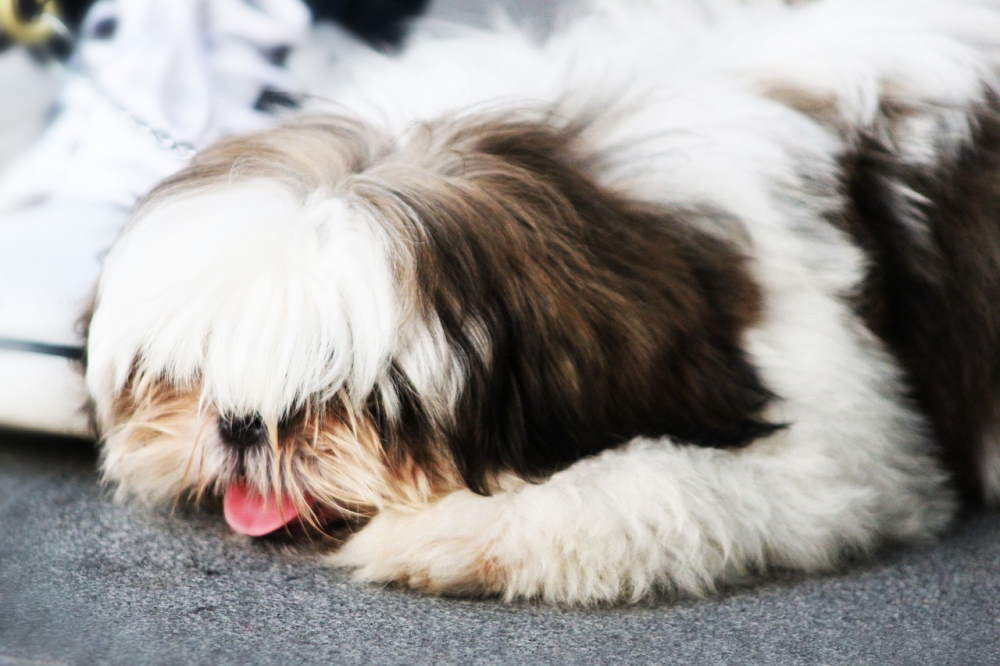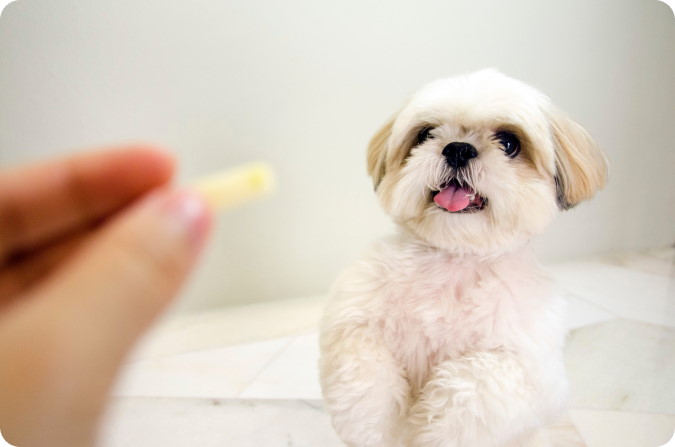- Home
- Training
Shih Tzu Training: Training the Independent and Assertive Shih Tzu Breed
By Everything Shih Tzu Updated January 19, 2023
Training a Shih Tzu may sound like an impossible task, but with the right tips and tricks up your sleeve, you'll be able to teach your pup how to behave just in time for when the guests start arriving!

Shih Tzus are one of the most beloved breeds of dogs and for good reason. They are incredibly loyal, affectionate, and intelligent.
But, like all dogs, they require proper training in order to be the best possible companion.
In this article, we will discuss some of the basics of Shih Tzu training. From the importance of training your dog and addressing common behavioral issues--to basic commands and potty training.
With a breed that is known for being independent, stubborn, and possibly even feisty, we understand how difficult this process can be.
So, if you want to learn how to train a Shih Tzu the right way, then read on!
The Importance of Training Your Shih Tzu
Training your dog is an essential part of being a responsible pet owner.
Not to mention that a badly behaved Shih Tzu is no fun to be around and can wind up annoying your friends at best and, at worst, end up in a lot of trouble.
Without structure and boundaries, your dog may engage in unwanted behaviors such as:
- excessive barking
- jumping or pawing to get attention
- relieving themselves all over your home
- chewing furniture and other household items
- digging under fences to escape, or
- aggressively challenging other pets and people.
By training your dog properly, you can help stop these destructive habits from developing.
There are also some other benefits that come with training your dog, such as:
- Training your dog can help to reduce their anxiety levels and keep them from getting into trouble. Dogs that have been trained are less likely to bark incessantly or act out in destructive ways.
- Training your dog can provide you with peace of mind. Knowing that your pet has been taught basic obedience commands will make it easier for you to relax when they’re off leash or around other people and animals.
- Training your dog can help you build a stronger bond with them. By taking the time to teach them new skills, you’re showing them that you care about their well-being and want to spend quality time with them.
- Training your dog can make it easier for them to learn other behaviors and commands in the future. Dogs that have already had some training will pick up on new commands quicker than those who haven’t had any training at all.
So, not only is training necessary for teaching them acceptable behavior and setting boundaries, but it also strengthens the bond between you and your pup.
Providing consistent training and ample mental stimulation for your Shih Tzu will ensure that they remain happy, well-mannered, and a pleasure to have around!
The Key to Training the Shih Tzu Breed
 Photo by andrescarlofotografia on Pixabay
Photo by andrescarlofotografia on PixabayWhether you're a seasoned Shih Tzu owner or just starting out, training your pup is one of the most important steps for creating a happy and harmonious relationship.
Before you start, here are four specific tips that you should bear in mind when training your Shih Tzu:
- You are the leader– When training your pup, it's very important that your dog knows that you are the leader of the pack and in full control; otherwise, it will be your Shih Tzu who becomes the boss.
- Use a leash – Shih Tzu are very active and can easily become distracted during training sessions, so use a leash when teaching them commands.
- Create a quiet space - It is important to have a place to train your dog that does not have anything else around, like other pets or people who could take their attention away from training. This way, they can focus on what you are teaching them. Choose a place that is quiet and comfortable so they will not get distracted or feel anxious.
- Have patience and be consistent – Training any dog requires patience and consistency, but it is particularly important for the Shih Tzu.
- Stick to a routine – a Shih Tzu does not respond well to surprises and needs structure and routine in order to learn effectively.
By keeping these tips in mind, you’ll be able to train your pup more effectively and create the happy and harmonious relationship you’ve been dreaming of.
What You Need to Know Before Training Your Shih Tzu
Before you begin training your dog, there are a few things you should consider.
First, it's important to understand the breed's temperament and needs.
Shih Tzu needs plenty of attention and affection, and they thrive on positive reinforcement.
When training your pup, it's important to be patient and consistent and provide lots of praise and rewards.
Second, you'll need to make sure you have the right tools for the job. This includes a collar and leash, a few treats, and some toys that your pup will be interested in.
It's also important to have an area set up for training that is free from distractions.
Finally, it's important to understand the basics of dog training.
This includes how to give commands, how to reward good behavior, and how to correct bad behavior.
These are all key elements of successful training, and they will help you and your pup achieve success.
Training Your Dog to Follow Basic Commands
 Max is waiting for his next Shih Tzu training cue ©everythingshihtzu.com
Max is waiting for his next Shih Tzu training cue ©everythingshihtzu.comBasic commands are the foundation of obedience and helping your Shih Tzu understand boundaries.
Commands such as 'sit,' 'down,' 'stay,' and 'come' are all essential to teaching your Shih Tzu how to behave in various settings.
When using basic commands, it is important to be consistent in how you deliver the command and the reward you offer when they obey.
Start by saying each command several times in a clear and concise manner while using hand signals to help your pup get familiar with what you are asking of them.
When they follow the command correctly, give them praise, and a treat or reward, as this helps reinforce the desired behavior.
It is also important to practice basic commands in different settings so that your pup can be successful no matter the environment.
Finally, always remember to be patient with your pup, as they may take longer than other breeds of dogs to master certain commands due to their stubborn nature.
Check out these basic dog commands and learn the step-by-step process of training your dog to learn each one.
Potty Training Your Shih Tzu
Potty training your dog isn't complicated, but it is an essential component of the training process.
Keep the following tips in mind to make potty training your pup a success.
- Establish a schedule and be consistent with it.
- Select a spot outside or indoors that you would like to be your pup's designated potty area and take them there on a leash each morning.
- Say a command to prompt them to eliminate, such as 'Go potty' or 'Bathroom.' When they do, reward them with a treat and lots of praise!
- Make sure to also take them out after meals, naps, and playtime.
If your pup has an accident inside, don't punish them; simply interrupt them and take them to their designated spot.
It is also to be mindful of your dog’s body language, so if they need to relieve themselves, you can take them outside before they go in the house.
Remember that patience is key during this process - the earlier you start to train your pup, the higher your chances of success!
If you’re teaching your pup to relieve themselves inside, our article on how to train your dog to use potty pads will be of great assistance.
Crate Training a Shih Tzu
Crate training your pup can be a great way to keep them safe and secure when you are not home.
Start by introducing your Shih Tzu to their crate and rewarding them with treats when they go in.
Make sure to leave the door open and do not force them to stay in the crate.
Gradually increase the amount of time they spend in the crate and provide them with toys to keep them occupied.
Check out "Crate Training Your Dog" and learn how to get your dog to enter the crate willingly and on command.
Leash Training Your Shih Tzu
Leash training is an important part of training them to be well-behaved when out in public.
Start by getting your Shih Tzu used to wear a collar and leash.
Then, take them for short walks around your neighborhood and reward them with treats for following commands.
Gradually increase the distance of the walks and make sure to be consistent.
Socialization Your Shih Tzu
It is very important to provide your dog with ample socialization opportunities. After all, nobody wants the demise of the neighborhood and their home courtesy of an anti-social pup!
Plus, getting your dog out to socialize can be a really enjoyable experience, both for you and your pup.
Not only does it give you the chance to catch up with other pet owners, but socializing your bright-eyed buddy comes with some benefits too!
Studies show that dogs who are well-socialized from an early age are more confident and have better problem-solving skills when given unpredictable situations.
In addition, with proper socialization training, dogs learn healthy interaction skills that have far-reaching benefits.
They become better behaved, calmer when in the presence of other animals, more relaxed, and happier – not only that, but they understand their place in the pecking order as part of a group.
So not only will you be giving them a chance to meet new people and pooches, but also teaching them the valuable lesson of how to deal with any unexpected (yet friendly) surprises along the way!
Separation Anxiety
Many dogs get anxious when they are alone, especially puppies and dogs adopted from a shelter.
The difference is when a dog is so stressed, they act out in ways that are damaging to both your home and to themselves.
They have become overly attached to their humans and can't stand to be separated from them.
Sometimes they will grow out of it on their own. But more than likely, you will have to help them cope with their separation anxiety.
Using a pet camera to see how your pet behaves when you are away from home can help you decide the best way to handle it.
Correcting Bad Behavior

Dealing with bad behavior in dogs can be challenging, but there are ways to correct it. Here are some tips on where to start:
- Start With Positive Reinforcement: Positive reinforcement is one of the best ways to modify bad behavior in dogs. When your pup is behaving well, reward them with praise, treats, and toys.
- Identify the Cause: Before you can address the bad behavior, you need to understand why it's happening. If your pup is barking excessively, for example, look for potential causes such as fear, anxiety, or boredom. Redirect inappropriate chewing to an appropriate item, like a chew toy.
- Set Clear Expectations: Make sure your pup understands what kind of behavior is expected of them. Give them clear commands and rewards when they comply.
- Provide Mental Stimulation: Dogs need mental stimulation to stay happy and healthy. Take your pup for walks, play interactive games, and teach them new tricks to keep them engaged.
- Use Timeouts: If your pup is displaying naughty behavior, try using timeouts. Place them in a quiet room or crate for a few minutes to let them know that the behavior is not acceptable.
- Seek Professional Help: If you're having trouble dealing with your pup's bad behavior, don't hesitate to seek professional help. A qualified trainer or behavioral specialist can provide you with valuable advice and guidance.
When it comes to correcting bad behavior, you want to make sure it’s done consistently and calmly.
Yelling or being overly aggressive won’t help – in fact, it can make matters worse.
Tips for Training Your Shih Tzu
Training your fur baby can be a rewarding and fun experience. Here are a few tips to keep in mind when training your pup:
- Start small: Start with basic commands and behaviors. Once your pup has mastered these, you can move on to more advanced tasks.
- Be patient: Training takes time and patience. Don't expect your pup to learn everything in one day.
- Be consistent: Consistency is key when it comes to training. Make sure to use the same commands and rewards each time.
- Use rewards: Reward your Shih Tzu with treats, words of praise, or a toy when they complete a task. This will help reinforce good behavior and encourage your pup to keep trying.
- Reduce distractions: Training is difficult if your pup is easily distracted. Make sure to have an area free from distractions, such as other pets or children.
- Take breaks: Training can be tiring, so make sure to take breaks throughout the day. This will help keep your pup focused and motivated.
Common Training Mistakes to Avoid
It is important to be aware of common training mistakes to avoid when training your dog.
These include:
- using physical punishment or shouting at them instead of good reinforcement,
- being inconsistent with your training and expecting too much too soon.
- Additionally, it is important to avoid using too many treats as rewards and to make sure you are using the right training tools and techniques.
Best Way to Train A Shih Tzu

One of the best training methods for a Shih Tzu is positive reinforcement.
Positive reinforcement means rewarding desirable behaviors with treats and praise while ignoring or redirecting unwanted behaviors.
It is important to remember to reward your Shih Tzu immediately after they perform the desired behavior, as this will reinforce the command and help them learn it faster.
Another effective training method for a Shih Tzu is crate training.
Crate training helps to create a safe and comfortable environment for your dog and can be used to prevent destructive behaviors or accidents in the house.
When using crate training, it is important to reward your dog with treats or praise when they enter the crate.
Finally, obedience classes are an excellent way to train your dog and build a good relationship between you and your pet.
Obedience classes provide socialization for your dog and teach them basic commands such as sit, stay, down, come, and heel.
It is important to note that obedience classes will require more commitment from the owner in terms of time and money but can be very beneficial for both you and your pet in the long run.
Overall, there are many different training methods that work well for Shih Tzus.
Finding the right approach for your dog will depend on their individual needs and personality.
By using positive reinforcement, crate training, and obedience classes, you can effectively train your dog and build a strong bond with them.
Choosing the Right Training Tools
When it comes to training, there are a few key pieces of equipment that can make the process much easier.
- A collar or harness is essential to ensure you maintain control of your pup while training.
- A leash is also a must-have; avoid retractable leashes, as they can make training more difficult.
- Treats and a treat pouch can be used as rewards for good behavior, and a clicker can be used to help reinforce positive behaviors.
- A small crate can act as a secure safe haven during training sessions.
- Lastly, educational dog training books and puzzle toys can help provide guidance and mental stimulation for your pup.
By equipping yourself with the right tools, you’ll be well on your way to teaching your pup good behavior!
Final words
Training can be a great experience for both you and your Shih Tzu.
By understanding the basics of training, using rewards, and being consistent, you can help make sure your Shih Tzu is well-behaved and happy.
Also, it’s important to provide your Shih Tzu with the proper environment for training and choose the best training tools and techniques.
Following these tips and tricks will help you to unlock the potential of your Shih Tzu and will ensure that you and your Shih Tzu have a positive and enjoyable experience.
Now that you have the basics of training down, it’s time to get started. Make sure to be patient and consistent with your training and to provide plenty of praise.
With the right tools and techniques, you can unlock the potential of your Shih Tzu and have a happy and well-behaved companion.
- Home
- Training



